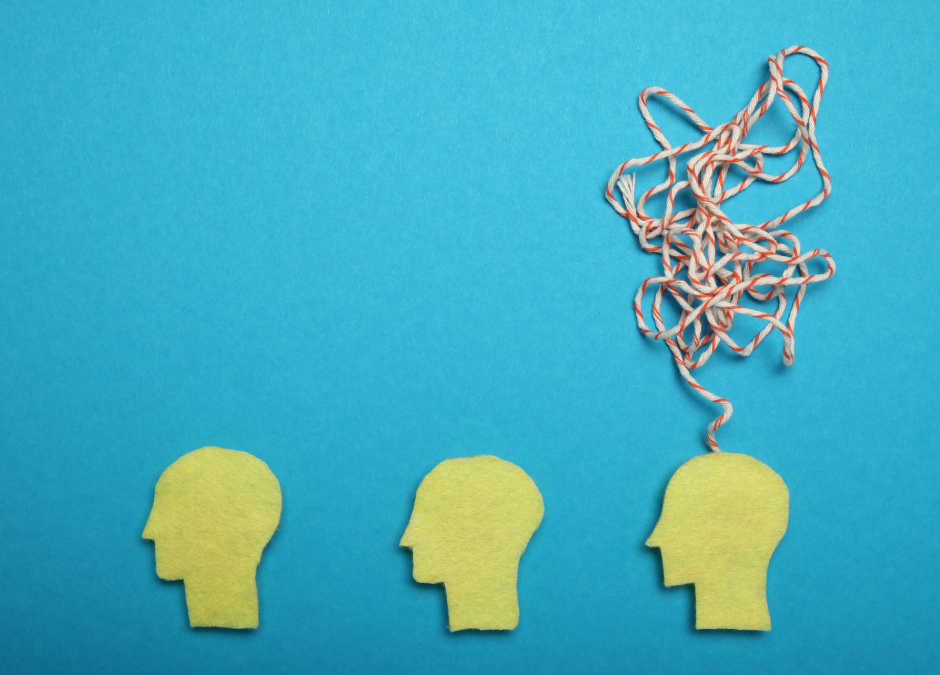Many of the students we work with struggle with focus, organization, and procrastination…all of which are common challenges for kids with ADHD.
We have a lot of conversations with parents who suspect their child or teen might have ADHD, or who have recently been diagnosed.
After having a lot of these discussions, we’ve found that there are still many common concerns and misunderstandings out there about ADHD works and the impact it has on students.
In honor of ADHD Awareness Month, we wanted to help clear up 7 of the most common myths and misconceptions we hear most often in our discussions with parents…
Common myths and misconceptions about ADHD
1. Myth: “They’ve always done well in school, so I don’t think they have ADHD.”
Truth: Lots of kids with ADHD do well in school, especially in younger grades where there is less homework to complete. Some students with ADHD are very smart and pick up new ideas quickly, so even though they’re not very focused or organized, they’re still able to understand the material and do well in school, at least at first. Other students with ADHD care so much about doing well and not letting down their parents or teachers that they’ll put in lots of extra effort at home to re-learn the material or spend hours on homework and assignments that take other students much less time to complete…so, they end up with good grades in the end but are really struggling behind the scenes to make that happen. In both of these cases, it’s entirely possible that students can be doing well in school and also have ADHD.
2. Myth: “They don’t have ADHD, they’re just lazy. They spend hours focusing on video games, so I know they can focus when they really want to.”
Truth: The challenge for students with ADHD is not that they can’t focus, it’s that they have trouble regulating their focus and attention and directing it towards the things that are most important for them to be doing right now. People with ADHD absolutely can stay focused under the right circumstances. In fact, they’ll often get intensely focused (“hyperfocused”) on activities they’re interested in — especially if they are novel, urgent, or highly stimulating — and become immersed in them for hours on end. But with activities that feel tedious, routine, or uninteresting, it can feel almost impossible for someone with ADHD to stay focused and prevent their mind from wandering off task.
3. Myth: “They can’t have ADHD. If they did, we would have heard something about it by now.”
Truth: ADHD is often underdiagnosed, especially in girls, people with higher IQs, and those with primarily inattentive (as opposed to hyperactive) ADHD symptoms. We talk to families all the time who just discovered that their high school or college student has had ADHD. In fact, several of the coaches on our team weren’t diagnosed with ADHD until high school, and others weren’t diagnosed until their mid-to-late 20s. So, even though doctors, teachers, and parents are better at recognizing it now than they used to be, there are still a lot of kids who are flying under the radar and not getting diagnosed until their late teens or early 20’s.
4. Myth: “They’ve been having a hard time focusing lately…does that mean they have ADHD?”
Truth: Not necessarily! There are lots of things that can cause students to struggle with focus and attention and look like ADHD when they actually aren’t. For example, maybe their sleep has been thrown off and they’re not getting the rest they need; there is a lot of overlap between the symptoms of sleep deprivation and those of ADHD. They could have a learning difference or an issue with processing speed that is making it hard for them to stay focused because they don’t understand what is going on in class. Or maybe they’re having a hard time focusing on anything because they are feeling anxious or depressed. This is why it’s so important to get an evaluation from a qualified mental health professional if you are concerned your child might have ADHD to make sure you have an accurate diagnosis. Which leads to the next myths, which are often a concern for parents who don’t get their kids tested for ADHD…
5. Myth: “I don’t want my child to be labeled.”
Truth: As humans, we are always putting labels on ourselves and others, whether or not we have an official diagnosis. If a student is not able to focus in class, struggles to get homework done, and gets bad grades, they may eventually start thinking they are “lazy” or “stupid”, when actually their brain is just wired a bit differently. Other people in their life may also start to make these assumptions, like classmates, teachers, or employers. While it should never be used as an excuse, a proper ADHD diagnosis can be a helpful explanation for why certain things may be harder (or easier) for their brain to do, which can reduce feelings of shame and help students feel more confident in their ability to learn strategies to manage their ADHD that will help them become more successful in the future.
6. Myth: “If my teen is diagnosed with ADHD, they will have to take medication.”
Truth: While the CDC does recommend a combination of medication and behavioral therapy or coaching as the most effective treatment approach for adolescents with ADHD, taking medication is always a choice, not a requirement. If your teen is diagnosed with ADHD and you would like to consider medication as an option, you can reach out to your pediatrician or work with a psychiatrist who specializes in ADHD to explore the pros and cons of medication for your teen and determine which prescription and dosage are likely to be the best fit for them. In the meantime, taking other steps to help your teen cope with ADHD through behavioral coaching, exercise, sleep, nutrition, and/or parent education are great next steps to take that will help set them up for success in the future whether or not they ultimately end up deciding to take medication too.
7. Myth: “People with ADHD aren’t very successful in life.”
Truth: Many well-known, high-achieving individuals have ADHD, including Michael Phelps (swimmer and holder of 14 career Olympic gold medals, the most by any Olympian ever), Sir Richard Branson (founder of Virgin Group), David Neeleman (founder of JetBlue Airways), Terry Bradshaw (quarterback, Super Bowl winner, and NFL commentator), Paul Orfalea (founder of Kinko’s), Howie Mandel (comedian and host of “Deal or No Deal”), Ingvar Kamprad (founder and chairman of IKEA), and many more!
Focus on strengths
A lot of families are overwhelmed when they first get an official ADHD diagnosis. Students worry about what this will mean for them, and parents worry about how they’re going to help their kids cope. They often end up getting stuck in this mode of seeing ADHD as a deficit.
But what if we focused on the POSITIVE aspects instead? Students with ADHD are constantly reminded about their mistakes and weaknesses during the school day. This makes it even more important to ensure they are coming home to an environment where they’re being celebrated for their strengths. As a parent, you have the ability to help your student understand what makes them amazing, and learn to use those strengths to help them find ways to get through the things that are a bit harder for them.
Here are some common strengths of ADHD…
- Hyperfocus: Individuals with ADHD can spend hours and hours completely immersed in something if they find it interesting. They can get into the zone with something they’re passionate about, which is why we see so many people with ADHD become successful entrepreneurs, inventors, and scientists!
- Creativity: ADHD allows many people to ‘think outside the box.’ People with ADHD tend to be more creative, and teens can use that creativity for big projects, or creative problem-solving.
- Willingness to take risks: People with ADHD often look at situations differently. They’re more likely to find the potential benefits of a ‘risky’ move, and are more willing to simply make a decision about something and act upon it! This helps them avoid indecision and is part of what gives them great potential for entrepreneurship.
- Thriving under pressure: In high intensity, fast-paced situations, ADHD often helps people process and perform better. Think of an EMT or someone working in the ER or a journalist out there trying to capture the story among the chaos. Those with ADHD have the potential to come alive and thrive in these high-pressure roles!
- Compassion: Having brains that are wired a bit differently can make people with ADHD more caring and compassionate; they tend to root for the underdogs and share their unconditional love with others who are struggling.
Using a strengths-based approach with your ADHD teen is one of the most helpful things you can do. This is something we work on every day with our students in coaching sessions, and it’s something you can do at home as parents as well, by helping your teen understand what makes them AMAZING!
More Tips + Resources
If you’d like to learn more about ADHD treatment options, there are many great online resources on how to help manage ADHD, including CHADD, ADDA, and ADDitude magazine.
Some of our favorite books on ADHD are…
- Delivered from Distraction by Edward Hallowell and John Ratey
- Superparenting for ADD by Edward Hallowell and Peter S. Jensen
- Parenting ADHD Now! By Elaine Taylor-Klaus and Diane Dempster
- Smart but Scattered by Peg Dawson and Richard Guare
- Late, Lost and Unprepared by Joyce Cooper-Kahn and Laurie C. Dietzel
- You Mean I’m Not Lazy, Stupid or Crazy?! By Kate Kelly and Peggy Ramundo
While a diagnosis of ADHD can feel overwhelming, there are lots of helpful resources available to help you navigate the process. If you’d like to learn more about ADHD coaching or have any other questions about how to support students with ADHD, feel free to sign up for a free parent consultation here.

Join 11,000+ parents helping their students earn better grades with less stress!

About The Author
Dr. Maggie Wray is a certified ADHD Coach & Academic Life Coach with a Ph.D. in Neurobiology and Behavior from Cornell and a Bachelor’s degree in Astrophysics from Princeton. She founded Creating Positive Futures in 2012 to help high school and college students learn how to earn better grades with less stress. Her team of dedicated coaches is on a mission to empower students to develop the mindset, organization, time management, and study skills they need to achieve their goals.
Related Posts
Other Posts You May Enjoy
Preparing for exams: 4 steps to success
As we get closer to exams, students are getting increasingly stressed out. And when teens are stressed about their exams, it can affect everyone else around them, too! Following the four-step planning process below can help students prepare more effectively for their...
How to finish the semester strong
Students' grades are the most important factor colleges consider when making admissions decisions.So, with the end of the semester approaching, how can you make sure your student is finishing the semester with the best grades they can? At this point in the semester,...
Why it’s hard for students to “just turn in” missing assignments, and how to get them unstuck
With the end of the semester on the horizon, many students may feel overwhelmed by low grades or feeling behind in some of their classes. As a parent, it can be stressful to see that your student has overdue work, or get notifications from their teacher that they’re...




